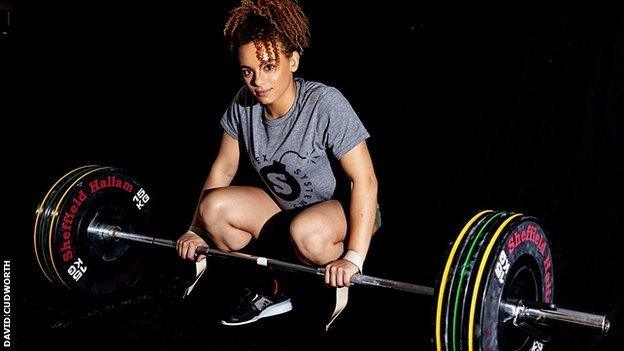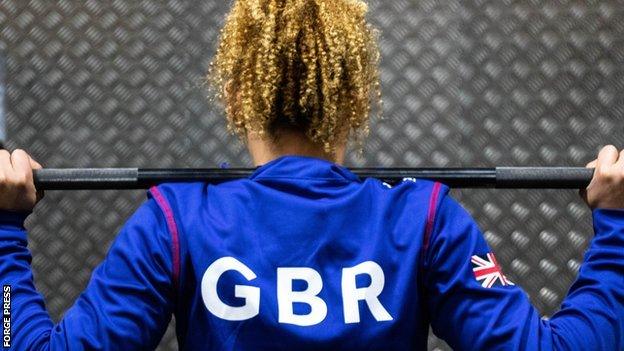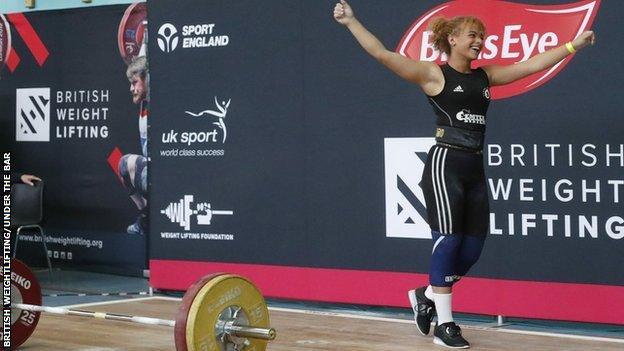Jenny Tong: How weightlifting helped 'save' one of Britain's fastest rising talents
- Published

Jenny Tong is juggling her sporting ambitions with a masters in legal and political theory, while also running a business and working as a research assistant
Jenny Tong endured family tragedy, years of drug abuse and was twice arrested before she was 19.
The former singer, who is now one of Britain's brightest emerging weightlifters, refuses to be defined by any of it.
But nor does she want to ignore her past troubles when she talks about her sporting rise, because trying to lift almost twice her body weight above her head helped her shed the weight of the world from her shoulders.
"It has saved me," she told BBC Sport. "It helped me find myself.
"I found a passion when I wasn't passionate about anything anymore. I didn't know who I was; I didn't know what I wanted.
"I know people who were in similar situations to me and who have fallen, and fallen hard.
"I want to show people that yesterday doesn't define who you are today."
'Life experience provided motivation'
Just four years after "accidentally" taking up weightlifting, the once aspiring entertainer, who attended one of the world's most famous performing arts schools before going on to get a degree in international relations and politics, holds three British Under-23 records and finished fifth at the European Youth Championships in Romania.
Tong stands 5ft 2ins tall with her hair down, or 5ft 5ins with it up, weighs in at 59kg and reckons she is "ageing backward" because she is asked for ID when buying energy drinks these days.
She might be small, but she is undoubtedly powerful. This week she lifted 82kg in the snatch to equal her best, and set a new benchmark of 101kg in the clean and jerk for a combined new record of 183kg.
Stuart Martin, British Weightlifting's performance manager, works with Tong and says her "intrinsic motivation" is one of her greatest strengths.
"Her life experience has probably driven a lot of this motivation," he said.
"The nice thing about Jen is that she has the tools to keep going. She is constantly moving in a positive direction.
"You also can't ignore the fact that she is technically very capable and physically very capable in some areas, who like any lifter has others to work on."
'I didn't see myself living beyond 21'

As a teenager Jenny Tong attended the Brit School, a performing arts institution that counts Adele and Rizzle Kicks among its alumni
Tong is now in contention to represent Britain at the senior European Championships in Moscow next year, further fuelling her ambition to lift for her country at the 2022 Commonwealth Games in Birmingham.
Her mother Elaine has not been around to see those successes, dying soon after Tong's 18th birthday, less than two years after being diagnosed with a brain tumour.
"There is not a day that goes by that I'm not proud of the person I have become," said Tong. "For a few years I don't think I saw myself living past 21, and I certainly didn't see myself breaking records in a sport I'd never tried before.
"I'm becoming the woman my mum dreamed of me being. That doesn't necessarily entail breaking records or being a champion or being the best at anything; it is being the best version of me."
As a youngster growing up in a small village outside the southern Spanish city of Granada, Yorkshire-born Tong says she was a "bit of a diva" who was always singing and had a love for dance and theatre.
Sport was also a big part of her upbringing, with judo the main focus.
'I didn't see I had a problem'
As for school, it was something she "didn't engage in". By 11, she was skipping classes and from there, Tong admits, she "spiralled" downwards.
"I was bright, had common sense and had wits about me, but academically I was far behind," she said.
"The easiest option for me was to ignore what everyone else was doing in lessons and do my own thing and then, rather than just ignore people, I thought I might as well not go at all.
"At first I was excluded for a few weeks for bad behaviour and drugs. I lost control, essentially."
By the age of 14, she was kicked out of school and returned to England where her father was still living.
"I knew it was all going wrong, but was a little in denial I guess," she said.
"I didn't see that I had a problem, but I did have a drug problem at that point. It was a cocktail of things, generally pills, ecstasy, cocaine and cannabis.
"My dad was told everything when I moved back to Hull and seeing not just the look of hurt and upset but disappointment in his eyes was a pain like I've never felt before.
"I swore I'd change, that I'd do better."

Jenny Tong has recently moved into the 59kg category after previously competing in the 55kg class
But within months she was arrested for possession of cannabis.
Tong went home shaking that night, and it would take years to completely rid herself of her drug habit.
She eventually returned to school and after two years of applying herself she was an A* pupil in a number of subjects.
It is something she is "most proud of", even though she revised while smoking cannabis in the park.
During one such study session, she was again arrested and spent a night behind bars. She was registered as a young offender and later ordered to do community service.
"I thought I was past all that, but I was quickly reminded that I wasn't," she said.
Following in the footsteps of Adele
She might have been in the most trouble she'd ever been in, but Tong did not allow it to undo the progress she had made.
Her studies led her to pursue a career as a performer, following in the footsteps of Adele and Amy Winehouse by being accepted into the Brit School.
And so she was on the move again, this time to London with her mother, who moved from Spain to support her daughter.
Heartbreak, however, was to follow as Elaine revealed she had been diagnosed with a brain tumour.
"Mum started chemo and I suddenly became a young carer," said Tong. "I didn't know what was happening.
"My mum was OK for a few months and encouraged me to go to open mic nights. We really did spend the last years together bonding over music and I'm so grateful for that time and experience."
Her mother's death once again led Tong to find solace in substance abuse. This time nitrous oxide, "nothing hardcore" as she puts it.
"To me, I didn't feel like I was abusing drugs - and I was," she said. "I lost brain cells during that time, I was literally starving my brain of oxygen."
Without her mother, "her muse", Tong searched for new beginnings once again.
She returned to books and, after independently sitting A-levels in Spanish and politics as a 17-year-old while still at the Brit School, she moved north to start university.
It was an opportunity to redefine herself, but "by accident" she found her calling in weightlifting after being encouraged to sign up to the sport by fellow lifter, and now close friend, Beth Parker at the University of Sheffield's sports fair.
Breaking boundaries

Jenny Tong has broken five British Under-23 records in the past month
She enrolled in a beginners course, displayed natural talent and quickly developed under the tutelage of coach Dave Hembrough at Hallam Barbell.
Within a year she was competing on the national stage - and she loved it.
"People were cheering for me on a stage that I never thought I'd be on in a sport I never expected," she said.
"The past five years have very much been about breaking boundaries set for me.
"In the years that I lost myself, there were so many people that were judgmental and judged my mum. It was my life and they were my mistakes. All she wanted was to see her little girl shine - she wanted me to achieve something."
And she has, collecting a number of titles in the process.
Tong has also moved quickly into coaching, first taking on a role at her local club before going on to be appointed a pathway coach and making her international debut as an assistant coach at the European Union Confederation Cup in Ireland earlier this year.
Academically, she is also determined to do heavy lifting, beginning a masters degree in legal and political theory at the University of York, while also working as a research assistant.
"I went to uni to study politics because it is what I believed I wanted to do; I want to help people and by going on to do my masters I hope to go on to become a legal advisor," she said.
"Weightlifting for me was the best accident that ever happened to me because I suddenly found a love for something that was a love of my own.
"No-one else was saying this is what you should do, no-one was there trying to encourage me in that direction and at the same time no-one said I couldn't do it.
"Taking ownership of everything, juggling training, a degree, friends and everything was my own doing.
"I helped myself when no-one else could."